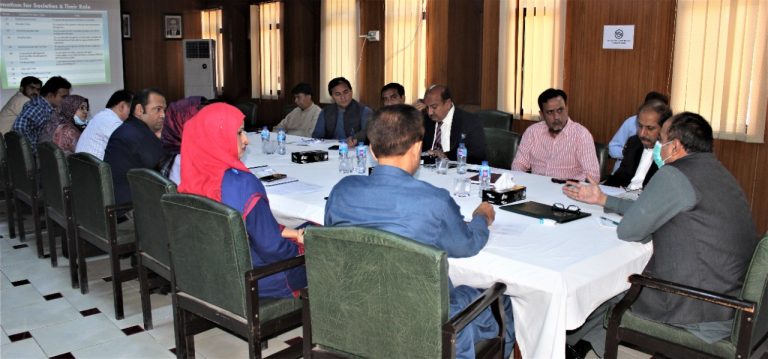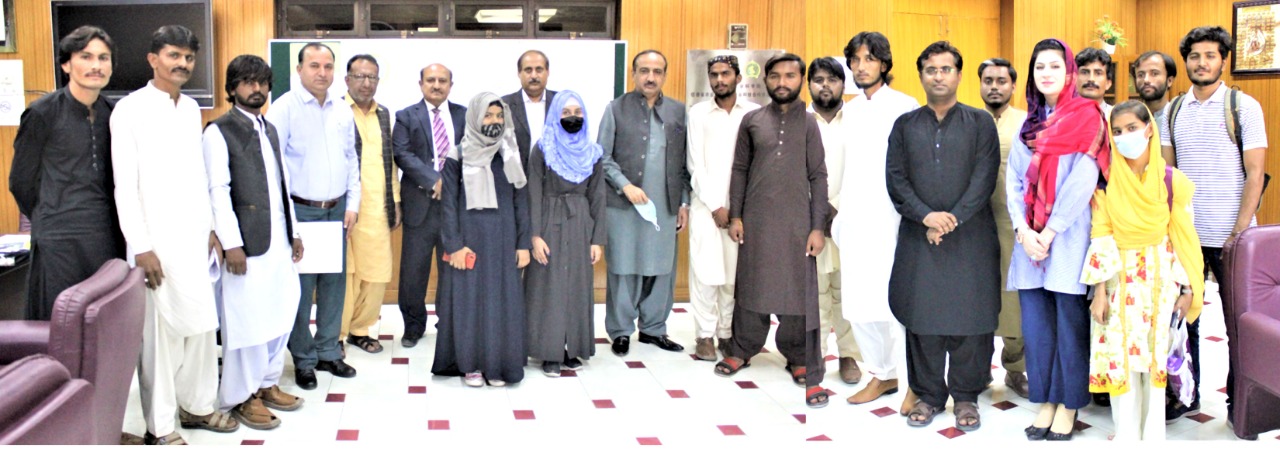
Officials of International Trade Center and Consultants discussed the plan with Sindh Agriculture University
Tando Jam
The United Nations (UN) and the World Trade Organization (WTO) have proposed the ‘Growth for Rural Advancement and Sustainable Progress (GRASP) plan’, implemented through the International Trade Centre (ITC), to reduce poverty in by strengthening small-scale agribusiness in Sindh and Balochistan.
This was informed in a meeting held here between Sindh Agriculture University (SAU) Tandojam and Small and Medium Enterprises (SMEs) in the conference hall of the university on Friday. The meeting was presided over by Dr. Fateh Marri, Vice Chancellor. On behalf of SMEs and ITC, National Consultant Babar Malik, Former Chief Secretary of Sindh and Consultant Abdul Subhan Memon, Local Consultants Ubaid Khan, Imran Inam, SME Development Specialist ITC Umar Arfi, Director Advancement and Financial Assistance (SAU) Dr. Muhammad Ismail Kambhar and others participated.
Speaking on the occasion, Vice Chancellor Dr. Fateh Marri said that there was a perception that the results of investment in agriculture is not beneficiary, but research institutes and the international community have rejected this perception and the agricultural industry is rapidly taking a beneficial shape through production and agri-byproducts and its demand in the global market has multiplied,
 He said that women, who make up half of the country’s population, have been deprived of constant investment and practical role, therefore it is suggested to provide opportunities to them for representation and investment.
He said that women, who make up half of the country’s population, have been deprived of constant investment and practical role, therefore it is suggested to provide opportunities to them for representation and investment.
He said that Sindh Agriculture University is providing research and teaching environment to its graduates on agricultural modernization, smart agriculture, modern farm structure, and protection of new commodities and better breeds of animals. “We have ideas, but resources and technology are limited, so our development is slow,” he said emphasizing relying on field data for all initiatives, not just table data.
Babar Malik, National Consultant, said that the Growth for Rural Advancement and Sustainable Progress (GRASP) project was launched by United Nations and the World Trade Organization to reduce poverty in the country by strengthening small-scale agribusiness in Sindh and Balochistan, which will be mobilized with the participation of local partners,
He said that the project would provide financial and technical assistance to the stakeholders, experts and young scholars from rural areas of Sindh for the proposals of agricultural development and especially for the transition of agriculture to industry over a period of 6 years. The EU delegation to Pakistan has provided assistance with a budget of up to 48,000,000 euros.
Former Chief Secretary Sindh and Consultant Abdul Subhan Memon said that we will involve Experts, Progressive Farmers and Agricultural Experts and Entrepreneurs Graduates of Sindh Agriculture University for this project and will benefit from their opinions and experiences in this regard.
SME Development Specialist (ITC) Umar Aarfi said that small and medium enterprises are the main source of economic growth, yet they continue to face financial difficulties. SMEs play a role in creating employment, financial resources and alleviating poverty in rural areas in developing countries. In this regard, we are also conducting surveys in Sindh and Balochistan to create employment opportunities for the youth with the development of agro-industry.
Prof. Dr. Muhammad Ismail Kambhar said that Sindh Agriculture University is highlighting the potential of its graduates through modern teaching and research methods, and it is better to get higher yields by injecting cattle, to give preference to such breeds, which to improve productivity, he briefed the government on the university’s efforts and initiatives. (PR)
________________________